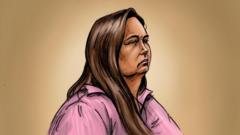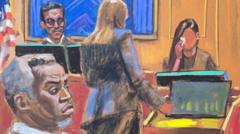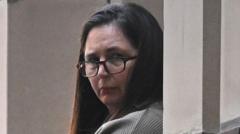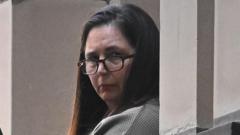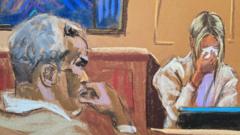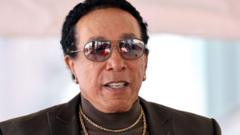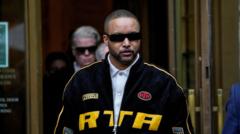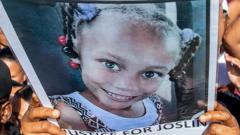After decades in prison for the murder of their parents, the Menendez brothers seek a chance at parole through resentencing.
**Menendez Brothers Await Resentencing: A Path to Possible Freedom**
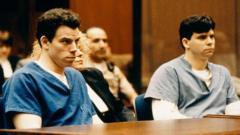
**Menendez Brothers Await Resentencing: A Path to Possible Freedom**
As Erik and Lyle Menendez face a judge for resentencing, the controversial case reignites debates on justice and abuse.
In a pivotal hearing set for Thursday and possibly extending to Friday, Erik and Lyle Menendez will present arguments to a judge regarding the possibility of resentencing in the wake of their infamous murder conviction. Having spent more than three decades in prison for the brutal killings of their parents, Kitty and Jose Menendez, the brothers now interrogate the very convictions that have haunted them since their youth.
The case has gained cultured traction, especially following a Netflix series that re-examined their tumultuous family history, prompting many supporters to question the fairness of the original trial. During their resentencing hearing, the focus will shift from guilt or innocence—which was established in their convictions—to what the Menendez brothers have achieved during their incarceration. The judge's ruling could significantly impact their futures by making them eligible for parole, which would mark one of the most consequential developments in a case that remains contentious even after decades.
The 1989 murders took place in their Beverly Hills home, where the brothers, then just 21 and 18 years old, shot their parents in a violent act that has since been subject to narrative shifting and critical reevaluation. Prosecutors argued that their motive was driven by greed, looking to inherit their parents’ fortune, while the defense claimed the brothers acted out of self-defense after years of pervasive abuse. Their high-profile trials in the 1990s captivated audiences, marking one of the early instances of live courtroom coverage, yet resulted in convictions amidst a backdrop of trauma seldom articulated by the legal system at the time.
On the day of the hearing, both sides will present witnesses, including family members and prison officials, aiming to influence the judge’s decision. Any testimony from the Menendez brothers themselves could dramatically change the dynamics of the hearing, further illuminating the issues at stake. Family support for the brothers has been varied with some, like Kitty Menendez's brother Milton Anderson, vocally opposing their release, while others advocate tirelessly for their freedom.
The potential outcomes of the resentencing hearing lie on a spectrum: while the judge's approval could grant a new sentence and eligibility for parole, it wouldn’t guarantee immediate release; the Menendez brothers would still need to convince the parole board of their rehabilitation. Conversely, if the judge decides to uphold their original life sentences, the brothers may continue to fight through avenues of clemency or a retrial that considers claims of abuse.
The urgency of the hearing is compounded by the new evidence recently filed, which includes disturbing testimonies about childhood trauma, such as allegations from former boy band members that could reshape public perception. With Los Angeles County's new District Attorney Nathan Hochman opposing the resentencing request, the hearing represents a tangible intersection of paths between justice advocacy and the practicalities of the legal system.
As the Menendez brothers stand at the forefront of a struggle that encapsulates deep societal issues surrounding abuse and accountability, the outcomes of this hearing could provide crucial insights into their futures and reignite dialogues on how the American legal framework understands and addresses complex narratives of trauma.
The case has gained cultured traction, especially following a Netflix series that re-examined their tumultuous family history, prompting many supporters to question the fairness of the original trial. During their resentencing hearing, the focus will shift from guilt or innocence—which was established in their convictions—to what the Menendez brothers have achieved during their incarceration. The judge's ruling could significantly impact their futures by making them eligible for parole, which would mark one of the most consequential developments in a case that remains contentious even after decades.
The 1989 murders took place in their Beverly Hills home, where the brothers, then just 21 and 18 years old, shot their parents in a violent act that has since been subject to narrative shifting and critical reevaluation. Prosecutors argued that their motive was driven by greed, looking to inherit their parents’ fortune, while the defense claimed the brothers acted out of self-defense after years of pervasive abuse. Their high-profile trials in the 1990s captivated audiences, marking one of the early instances of live courtroom coverage, yet resulted in convictions amidst a backdrop of trauma seldom articulated by the legal system at the time.
On the day of the hearing, both sides will present witnesses, including family members and prison officials, aiming to influence the judge’s decision. Any testimony from the Menendez brothers themselves could dramatically change the dynamics of the hearing, further illuminating the issues at stake. Family support for the brothers has been varied with some, like Kitty Menendez's brother Milton Anderson, vocally opposing their release, while others advocate tirelessly for their freedom.
The potential outcomes of the resentencing hearing lie on a spectrum: while the judge's approval could grant a new sentence and eligibility for parole, it wouldn’t guarantee immediate release; the Menendez brothers would still need to convince the parole board of their rehabilitation. Conversely, if the judge decides to uphold their original life sentences, the brothers may continue to fight through avenues of clemency or a retrial that considers claims of abuse.
The urgency of the hearing is compounded by the new evidence recently filed, which includes disturbing testimonies about childhood trauma, such as allegations from former boy band members that could reshape public perception. With Los Angeles County's new District Attorney Nathan Hochman opposing the resentencing request, the hearing represents a tangible intersection of paths between justice advocacy and the practicalities of the legal system.
As the Menendez brothers stand at the forefront of a struggle that encapsulates deep societal issues surrounding abuse and accountability, the outcomes of this hearing could provide crucial insights into their futures and reignite dialogues on how the American legal framework understands and addresses complex narratives of trauma.


